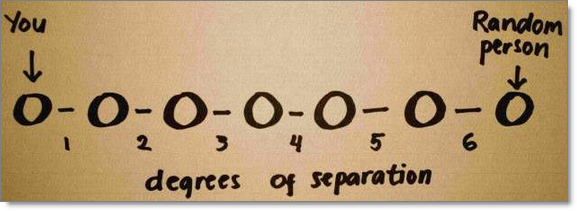“Who do you know?” is perhaps the most important networking question you’ll ask, especially if you are in a serious job search.
Last week someone in my LinkedIn Group asked some clarifying questions about Degrees of Separation. We disagreed on what a Degree of Separation is.
Here’s how I see it:
If I know you, your are my 1st degree of separation contact.
If you introduce me to your spouse, they are my 2nd degree of separation contact.
If your spouse introduces me to their colleague, they are a 3rd degree of separation contact…. and so on.
It kind of looks like this (thanks for the image, Shari at Delivering Happiness):
Let’s say the 3rd degree of separation contact is Shari…
My position is that Shari is always and forever a 3rd degree of separation contact, regardless of how strong our relationship becomes later. In other words, let’s say that Shari and I go into business together… we become business partners. Our relationship is clearly very, very strong.
But she is still a 3rd DoS contact, isn’t she?
That has been my position for years… until Lamar challenged it.
Honestly, that’s still my position, but I can see his point.
If you come to me and say, “Can you introduce me to Shari? You know her, right?” I’m going to think, “Of course I know her, I work with her.” As far as you are concerned, I’m YOUR 1st degree of separation contact while Shari is your 2nd degree of separation contact.
To me, she’s a 3rd degree of separation contact, so she’s really YOUR 4th degree of separation contact, but that doesn’t seem to matter. I have such a strong relationship with her, she seems like my 1st degree of separation and your 2nd degree of separation.
Okay, I can see that, and in that way I agree with Lamar.
And, that’s how LinkedIn does it. Once Shari says “I know and trust you, let’s connect…” she becomes my 1st DoS in LinkedIn.
But I’ve never really liked that.
For practical reasons, I guess it’s okay (thanks Lamar, for helping me think through this). But one day Shari and I will be chilling and she’ll say, “How did we meet, anyway??” And I’ll say, “John Smith introduced me to his wife, who introduced me to you…. ”
And I can see that Shari was, and still is, my 3rd degree of separation contact.
Does any of this matter? And Who Do You Know…?
YES, it matters, and here’s why:
In your job search you MUST drill down on your network contacts. You must ask them the magic, powerful question: “who do you know….”
Who do you know that works at my target company?
Who do you know that is a programmer?
Who do you know that is in this industry?
Other ways to ask “who do you know” include: Who should I talk to? Who can you introduce me to?
The point is to get them, a 1st degree of separation contact, to introduce you to someone else.
Asking “who do you know,” to get deeper into your network, is absolutely critical in your job search. If you don’t do it, but you network a lot, you can have success. But this single question is THE question that should get you closer and closer to a hiring manager, a decision maker, and someone who is in a position to end your job search.
More on this idea tomorrow… for now, what do you think? How have you seen the degree of separation equation like I described it, or as Lamar describes it?



Everybody needs to be diligent about building an infrastructure of caring people, willing places and useful things. Big numbers of people are not the answer. If I understand Linkedin correctly, it’s not what I bring to the table for myself that matters most. Instead, it’s what I bring to the table for other people and other people bring to the table for me.
If what I need most to find is at the third or fourth degree, how do I draw people I do not know and the folks I know do not know (since we begin at the 3rd degree) into my sphere of influence?
Here’s an interesting article about degrees of separation – we’re just 4.74 degrees away, not 6 from anyone.
https://www.nytimes.com/2011/11/22/technology/between-you-and-me-4-74-degrees.html
Love how you’ve incorporated this into JibberJobber. There are a handful of people I’ve known for many years and neither of us recall how/where we met or who introduced us (and I’m not THAT old! 🙂 ).
@Lamar: You say: “If I understand Linkedin correctly”… I’m not sure I would say or think that way. Don’t let the tool define how you network, or what your relationships are, or how to manage or think about them. They can guide you but they don’t need to define you.
I think what someone brings to the table should/could be really quite significant.
I think the answer to your question is simple… part of it is in the blog post (asking people for introductions and referrals), and just networking into them. LinkedIn can show you a path to the “third degree,” according to their system. Go down that path.
@Kim: Thank you …. and I’m old enough to really appreciate this feature 🙂